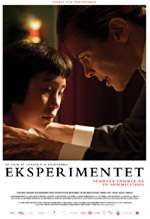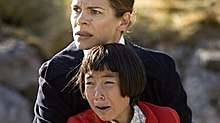Eksperimentet
Eksperimentet (English: The Experiment) is a 2010 Danish drama film written and directed by Louise Friedberg, and starring Ellen Hillingsø.[1] The film premiered on 28 August 2010 in the Katuaq Culture Centre in Nuuk, the capital of Greenland.[3][4] The release date of the film in Denmark was 9 September 2010.[2]
| Eksperimentet | |
|---|---|
 | |
| Directed by | Louise Friedberg[1] |
| Produced by | Signe Leick Jensen Birgitte Skov[1][2] |
| Written by | Maj Rørbæk Damgaard Louise Friedberg Rikke De Fine Licht[1][2] |
| Starring | Ellen Hillingsø Nukaaka Coster-Waldau[1] |
| Music by | Ola Kvernberg[1] |
| Cinematography | Magnus Nordenhof Jønck[1] |
| Edited by | Martin Schade[1] |
| Distributed by | Sandrew Metronome Filmdistribution A/S[1] |
Release date |
|
Running time | 93 minutes[5] |
| Country | Denmark |
| Language | Greenlandic[1] |
Background
The film deals with a 1950s social experiment and the problem of cultural genocide in Greenland. In 1951 the Danish colonial authorities, with dubious consent from their parents or guardians, removed 22 Greenlandic Inuit children (9 girls and 13 boys) from their homes, relocating them to Denmark for adoption and education.[4] The selected children, aged between 6 and 8,[6] came from disadvantaged families; the government planned for their adoption to integrate into the 'modern' Danish society with the aim of transforming the children into 'small Danes'.[7][4][6]

The surviving children lost their native language and culture, and suffered from the psychological trauma of being separated from their families most of their lives.[6][8] Some of the children were returned to Greenland after a year, where they were placed into an orphanage in Nuuk, rather than being returned to their families. Others stayed in Denmark for the remainder of their lives.[8] More than half died before reaching adulthood.[7][9]
In 2009, on behalf of the Government of Greenland (Greenlandic: Naalakkersuisut), the prime minister Kuupik Kleist demanded an official apology from Denmark for the failed social experiment.[9][10] Lars Løkke Rasmussen, the prime minister of Denmark, refused, while admitting that the event was "unfortunate".[7] His refusal leaves the issue of apology and compensation contentious between Greenland and Denmark.[11][12][13]
The film's lead actress, Ellen Hillingsø, urged Rasmussen to apologize to the victims.[14] In September 2010, Mimi Jakobsen, the general secretary of Save the Children (Danish: Red Barnet), the organization involved in the repatriations of 1951, issued a formal apology on behalf of the organization.[15][16]
Production
Director Louise Friedberg was inspired by reading I den bedste mening (2006) (With the Best Intentions), a memoir by Tine Bryld. A summary of the interview with Bryld was also released in 2006 as a 28-minute video under the same title. It was shown as part of Rethinking Nordic Colonialism, a Postcolonial Exhibition Project in the summer of 2006.[8][17]
Between 13 and 21 July 2009, Friedberg shot scenes for the film in Kangeq, a former settlement on the coast of Labrador Sea in southwestern Greenland, located approximately 18 km (11 mi) west-south-west of Nuuk, at the mouth of Nuup Kangerlua, the longest fjord in southwestern Greenland.[18] The old houses of Kangeq were used as a backdrop, as the settlement was to represent Nuuk in 1952.[19] The city center had many communal apartment blocks developed in the 1960s, which changed its character.[20]
The film was produced by Nimbus Film.[1] It was one of six films in 2009 receiving government grants because of their importance for the culture of Greenland.[21]
Cast
The cast has both Danish and Greenlandic members:[1][8]
| Actor | Role |
|---|---|
| Ellen Hillingsø | Nurse Gert |
| Nukâka Coster-Waldau | Margrethe |
| Morten Grunwald | Omann |
| Laura Skaarup Jensen | Karen |
| Kurt Ravn | Svendsen |
| Laura Bro | Høgh |
| Mads Ville | Dr. Brandt |
| Finn Nielsen | Møller |
| Domilia Marianne Singertat | Marie |
| Paniaraq R. Søltoft | Ingrid |
| Najaaraq Margit Davidsen | Dorthe |
| Kristian Falck-Petersen | Daniel |
Reception
Premiere
The premiere of the film in Greenland was attended by the prime minister and Maliina Abelsen, the minister for social affairs.[22] It was an emotional event, both because of the topic and because the issue of the official apology still unresolved. Several of the survivors are still alive.[6][8][23] Eksperimentet is the first film dealing with the dark episodes from Greenland's history as a former colony.[6] Others are likely to follow, stimulating more discussion and debate in the country,[6][22] as well as in Denmark.[24] The film was praised for its emotional appeal and acting. Critics thought the release dates in the summer may have limited the size of initial audiences.[6][22]
See also
References
- "Eksperimentet". Nimbus Film, Official Website. Archived from the original on 2011-07-19. Retrieved 28 August 2010.
- "Fakta om film". Danish Film Institute. Archived from the original on 24 June 2010. Retrieved 30 August 2010.
- "Verdenspremiere på 'Eksperimentet'". Kalaallit Nunaata Radioa (in Danish). 28 August 2010. Retrieved 1 September 2010.
- "Premiere på 'Eksperimentet'". Sermitsiaq (in Danish). 27 August 2010. Archived from the original on 2010-08-29. Retrieved 1 September 2010.
- "Eksperimentet" (in Danish). Katuaq Culture Centre. Retrieved 30 August 2010.
- "Anmeldelse: Stærk og rørende film". Sermitsiaq (in Danish). 29 August 2010. Archived from the original on 2010-09-19. Retrieved 29 August 2010.
- "No apology from Denmark". The Copenhagen Post. 20 August 2009. Retrieved 28 August 2010.
- "Eksperimentet vises i september". Kalaallit Nunaata Radioa (in Danish). 22 July 2010. Retrieved 28 August 2010.
- "Greenland demands apology for Danish child experiments". IceNews. 14 August 2009. Retrieved 30 August 2010.
- "Professor: Giv Grønland en undskyldning". Sermitsiaq (in Danish). 14 September 2009. Archived from the original on 23 September 2009. Retrieved 28 August 2010.
- "Kuupik: Fortiden skal klarlægges". Sermitsiaq (in Danish). 11 August 2009. Archived from the original on 2012-08-02. Retrieved 28 August 2010.
- "DF: Ingen undskyldning". Sermitsiaq (in Danish). 11 August 2009. Archived from the original on 2012-07-19. Retrieved 28 August 2010.
- "Vil have en undskyldning". Sermitsiaq (in Danish). 10 August 2009. Archived from the original on 2012-07-17. Retrieved 28 August 2010.
- "Hillingsø: Sig undskyld, Lars Løkke". Sermitsiaq (in Danish). 28 August 2009. Archived from the original on 2010-08-31. Retrieved 29 August 2010.
- "Red Barnet: Undskyld til grønlandske børn". Sermitsiaq (in Danish). 4 September 2010. Archived from the original on 2010-09-08. Retrieved 4 September 2010.
- "Red Barnet: Undskyld til grønlandske børn". Berlingske Tidende (in Danish). 4 September 2010. Retrieved 4 September 2010.
- "RNC* Documentation, Silver Screen Resistance". Rethinking Nordic Colonialism, a Postcolonial Exhibition Project in Five Acts: Iceland, Greenland, The Faroe Islands, Finnish Sápmi & Denmark/Finland/Norway/Sweden. Retrieved 28 August 2010.
- "TIL OPPLYSNING". Norwegian University of Science and Technology. Archived from the original on 15 June 2011. Retrieved 29 August 2010.
- "Kangeq med i film". Sermitsiaq (in Danish). 21 July 2009. Archived from the original on 12 September 2010. Retrieved 27 August 2010.
- "Optagelser til "EKSPERIMENTET" i Nuuk". Sermersooq municipality. Archived from the original on 2011-07-21. Retrieved 28 August 2010.
- "Tilskud til seks filmprojekter" (in Danish). Government of Greenland. Retrieved 28 August 2010.
- "'Eksperimentet' er rørende, stærk og vigtig". Kalaallit Nunaata Radioa (in Danish). 29 August 2010. Retrieved 30 August 2010.
- "Børnehjemsbarn udgiver erindringer". Sermitsiaq (in Danish). 25 August 2010. Archived from the original on 2010-09-24. Retrieved 29 August 2010.
- "Mary og Frede til premiere på "Eksperimentet"". Sermitsiaq (in Danish). 31 August 2010. Archived from the original on 2010-09-02. Retrieved 31 August 2010.